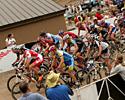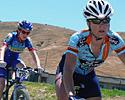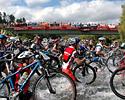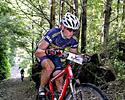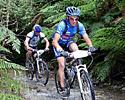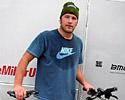MTB news & racing round-up for November 12, 2006Edited by Sue George Mountain bikers' sanctions raise questionsIn the past week, USADA has reported one-year sanctions for three US mountain bikers, and another possible sanction is in process. What all the athletes have in common is that they missed an anti-doping control after a major race. Cyclingnews reported that Jason Sager of Park City, Utah, and Cale Redpath of Durango, Colorado, "failed to present themselves for testing following the NORBA National Mountain Bike Series Race #4 in Deer Valley, Utah" on July 8th, and Alice Pennington "failed to show up for an anti-doping control" after the NORBA Series final event in Snowmass, Colorado, August 12th. In addition, Bart Gillespie, a 32-year-old racer from Utah, missed a doping control at another UCI race. Is USADA getting better at catching mountain bikers who dope or is something else going on? The question can not be answered with any certainty, but it is worth taking a closer look at information surrounding the cases.
According to the USADA's information about the testing procedure on their website, "The DCO [doping control officer] is obligated to make a reasonable effort to locate the athlete for testing. Before reporting to USADA that an athlete is unavailable for testing the DCO is specifically required to visit within a 24 hour period all locations on the Athlete Location Form and any applicable Athlete Change of Plan Form provided by the athlete." Interpretations of "reasonable effort" could vary. Sager dropped out of the Deer Valley event after he'd finished the originally scheduled three laps only to discover he had one to go. He decided not to complete the race and spent some time at the finish area watching other riders. According to his blog, "there wasn't another lap in the legs. Absolutely deflated, I watched a few guys race through, chatted with friends and family in the start/finish area for several minutes, and eventually rode home." The next day, he learned that he had missed a drug test and he contacted USADA to find out more. Sager, a father of one, has been on the out-of-competition-control list since January 1, 2006. He has never otherwise been sanctioned for doping. Being on that list means an athlete must inform USADA of his or her whereabouts at all times and never be more than two hours away from being tested when called. Sager commented on the out-of-competition tests, "Though it's a burden, it's one I support in the effort to demonstrate that our sport is made of clean athletes. I'll submit to their tests, on demand, as they request." In the information that Sager received with notification of his positive test and associated ban, USADA's chief officials had noted that staffing at the Deer Valley event was "inadequate," and that testing facilities were relatively distantly located. Two male chaperones were on site to escort all podium finishers and randomly assigned competitors to the drug testing area, which was in a basement about 200m from the finish. There were no signs directing athletes to the location. Sager claims he was not notified that he was called for random testing. He was not told at the start, nor did he see the whiteboard that is supposed to be adjacent to the start/finish and posted with randoms. Sager doesn't dispute the board was there, but was unable "to find an athlete willing to testify that he physically saw it." USADA did locate a third pro male rider selected for random testing that day, but he said would be willing to testify "that he was only aware of testing because there was a chaperone who grabbed him in the finish chute." Sager never finished the race, so no chaperone could pull him as he crossed the line. Sager said, "I am not here to dispute the missing the test, and I never have. I never made excuses for anything, but I do have to ask why we weren't notified in an adequate manner, and of course, I contested the sanction." Sager received a large bundle of documents along with a letter strongly encouraging him to sign off on his two year ban. However, he followed the procedure to write a letter of "compelling justification" to explain why he missed the test. His letter was rejected, and he was issued a two year ban. He then went through the arbitration process which has three possible outcomes: no fault, no substantial fault, and substantial fault. Only one athlete, Genevieve Jeanson ever received a "no fault" ruling under arbitration. While Sager was found not to be "significantly at fault", he was sanctioned for one year for a first offense. In Gillespie's case, he heard the announcement before his race that doping controllers would test the winner and two randoms after the event according to his blog. When he crossed the line, he saw the doping control officer grab one guy and heard the name of a second selection announced, so he figured he was not being tested that day. The 32-year-old Utah rider found out a few hours later that he was an alternate for testing after being called when someone else did not show up. He returned to the event several hours later, but it was too late. The wheels of process were already in motion. Final word on his case is pending. At the very least, these cases suggest that US Mountain bikers could benefit from more communication regarding anti-doping testing at racing events. Simonson & Emmett win Iceman Cometh
Mike Simonson and Kelli Emmett won the 17th Annual Iceman Cometh race near Travers City, Michigan. Both won in a similar style--solo and off the front. This year 2,800 racers tackled the course at this popular, season-ending race. Unlike many other years, racers enjoyed near-perfect course conditions over the 28.5 mile point to point route. Race director Steve Brown said, "We had a very wet October. Since we live on a big sand dune, the water packed the course down really well and made it fast. This was as good as it can get in Michigan." Amateur racers started early in the morning and faced below-freezing temperatures, but the day stayed clear except for occasional light snow and rain showers. Pro racers started later in the day, in a second wave, but they still competed in temperatures just above freezing. Kelli Emmett (Ford) convincingly won the women's race by nearly eight minutes. "I felt really good. It's the strongest I've ever felt at an Iceman. I went right from the gun." This was the fourth time Emmett won the race out of more than a half dozen appearances. "I'm from Michigan, and it's a race I've always done, usually with my dad. Unfortunately, he was very sick this year, so he couldn't do it." Emmett kept her dad in mind as she raced to victory in front of friends and family. Left on her own for the duration of the race, Emmett says she kept motivated by racing with the men. "I raced with the guys for most of the race. They encouraged me and pushed me." Emmett finished ahead of second-place Sara Kylander-Johnson (Trek/VW). Johnson suffered from end-of-season burnout as she tackled her second-ever Iceman. "I felt sluggish. I didn't have a good race. Then I lost my contact about 10 miles into the race. I contemplated quitting because the race is so sandy, you need to be able to see well to pick your lines. But I didn't want to quit." Poor vision notwithstanding, Kylander-Johnson rode most of her race alone. "It was a time trial." The men's race started fast and furious. Mike Simonson said, "I took off right from the start and got a 20 foot gap. I punched it a few more times, but both Brian and Tristan followed me. Going into the singletrack, Brian hit his pedal on a tree or something, so my gap opened up." Simonson extended it ultimately to about a minute. He sustained the gap throughout the race, but he said, "I couldn't see second place and didn't know how far back he was until we both finished." This was his first victory after competing in the race for seven consecutive years. What did he do differently this year? "I raced a different bike. I went with a 29'er." Cyclingnews' James Huang, who also competed in the race, noticed the prevalence of 29'ers at this year's race. "It was the perfect course for them. It was pretty flat, mostly doubletrack, with some singletrack mixed in." Starting the pros later in the day, after amateurs had a chance to finish their races and clean-up, meant the elite men and women were greeted at the finish by large crowds. Johnson said, "I'd estimate there were 4,000 spectators at the finish." So many racers and spectators suggest mountain bike racing is alive and well in the mid-west. Pro Expert Women 1 Kelli Emmett (Ford) 1.47.21 2 Sara Kylander-Johnson (Trek-Vw) 7.51 3 Jessica Woodard (Custer Cyclery) 9.51 4 Heather Holmes (Ford Cycling Team) 11.43 5 Laura Webb (Priority Health) 16.03 6 Kristina Andrus (Dean Bicycles) 16.46 7 Marne Smiley (Xterra) 22.11 8 Brinn Pope (Dean Usa) 24.54 9 Lisa Markley (Wolverine Sports Club) 26.07 10 Julie Bellerose 30.53 Pro/Semi Pro Men 1 Mike Simonson 1.36.57 2 Tristan Schouten (Trek-Vw) 0.29 3 Brian Matter (Pcw Hyundai) 1.05 4 Randy Laprairie (Macomb Bike & Fitness) 4.40 5 Jesse Lalonde (Gary Fisher) 4.46 6 Robert Herriman (American Cycle & Fitness) 4.55 7 Dan Jansen (Founders Ale-alger Racin) 6.30 8 Jason Buccellato (Klm) 6.31 9 Jason Lummis 7.22 10 Cole House 7.28 NZ’s premier mountain bike race attracts international sponsor
New Zealand’s Karapoti Classic, the longest running mountain bike event in the Southern Hemisphere, received international recognition with the signing of Scott Bicycles as its naming rights sponsor. Scott may renew sponsorship for up to five years.
Established in 1986, Wellington’s Karapoti Classic has been a key race in New Zealand mountain biking for more than 20 years. It was the first to attract 100 riders and the first to attract 1,000 riders, now the event’s self-imposed entry limit. Racers are drawn to a 50km course through Upper Hutt’s scenic, but rugged Akatarawa Ranges. Last year's event attracted riders from 11 countries.
“Scott is excited to be behind New Zealand’s premier mountain bike event,” said Colin Walker, who helped arrange the sponsorship. Initially a world leading innovator in the ski market, Scott ventured in to the bicycle market in 1986 with innovations in the mountain bike and triathlon markets. In more recent years, Scott has focused on carbon fiber technology, and the 2007 edition of the race will correspond to the launch of Scott's new lightweight carbon-fiber Spark bike.
Launched only this week, organizers report they already have 300 entrants toward the 1,000-rider limit. The Karapoti waiting list has created a culture of its own, with last year’s 500-strong waiting list prompting Karapoti Classic entry auctions on TradeMe.
“Karapoti’s popularity never fails to amaze us,” says event manager Michael Jacques of MDJ Media & Events Ltd. “Last year we sold out shortly after New Year, but right now we have twice as many entries as November last year so we think the 2007 event could be full before Christmas.”
In 2006, the record entries also brought a record winning time. Australian professional Peter Hatton clocked 2 hours, 18 minutes and 1 second to smash the record set by Kiwi Olympian Kashi Leuchs in 1998 by almost three minutes. Up and coming Rotorua rider Clinton Avery also broke the old record.
This year organizers are hoping to pit Hatton and Avery against the old record holder Leuchs and world champions Tim Vincent and Craig Gordon. Vincent, from Nelson, and Gordon, from Australia, have both won 24-hour mountain biking world titles. Vincent has won the Karapoti Classic three times (‘01, ‘03, ‘05), while Hatton (‘04, ‘06) and Leuchs (’98, ‘02) have both won twice.
Organizers will attempt to match up several past women's winners: former world junior champions Nathalie Schneitter (Switzerland) and Lisa Mathison (Australia), and Commonwealth Games silver medalist Rosara Joseph (New Zealand). US ski ace Bode Miller gets a mountain bike
US skiing star Bode Miller is not planning to trade in his skis for a bike, but he recently received a new BMC Superstroke 01 mountain bike for use when cross training off the slopes. Miller became a household name after he won two silver medals in the Giant Slalom and Combined events at the 2002 Winter Olympics. As a teenager, Miller shaved seconds off his World Cup times by using what were then innovative hourglass-shaped ("parabolic") skis. He drew attention to himself in the 2002 Olympic Slalom race, during which he hiked back up the course and then finished anyway after missing a gate. The American ski star will use his bike for more mobility at world cup venues. For example, it will be a quicker way for him to get to media conferences. He'll also warm up on his bike on rollers right before the start of a race. Referring enthusiastically to his new machine, Miller said, "What a fantastic bike!" Winter downhilling in SwitzerlandFreefall Zermatt announced a downhill race coming on December 10th on Switzerland's longest ski run. The course will travel from the Matterhorn glacier down to the town of Zermatt. Racers will drop 2,222m in less than 20 minutes after a Le Mans style mass start. Promoters described the course as "long and wide for the first half" and "narrow, steep and full of curves in the second half." They also advised participants to dress warmly given typically frigid temperatures at nearly 4000m in December. Coffs Coast Cycling Club gets new nameCoffs Harbour Cycle Club has changed its name to Coffs Coast Cycling Club. The club will host a three-hour mountain bike race on November 26th. It also plans an enduro event for next July. Coffs Coast has previously hosted rounds of the State Downhill Championships & Cross Country Championships. (All rights reserved/Copyright Knapp Communications Pty Limited 2006) |

|
January 2009 |
Recently on Cyclingnews.com |

